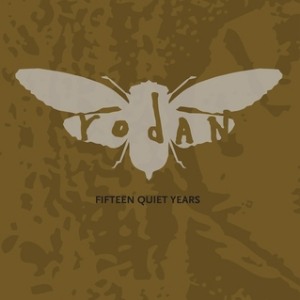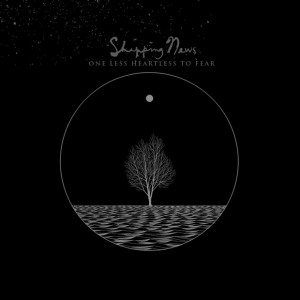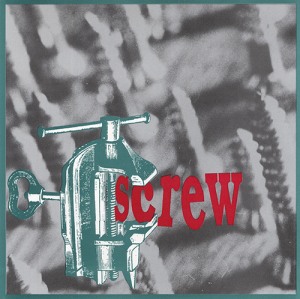
Picking up Rodan's Fifteen Quiet Years, a highly anticipated collection from the short-lived Louisville greats, was the highlight of my biannual decimation of Chicago record stores. One key caveat: I had already heard every song on the vinyl. I own a few copies of the How the Winter Was Passed single, grabbed The Machines from Record Service in Champaign to hear
"Darjeeling" (with the clerk, Todd Bell from Braid, praising my purchase on the merits of that song), mail-ordered Half-Cocked on VHS along with its soundtrack to hear “Tron,” scoured enough used bins to find the Compulsiv for Two single with the Aviary version of "Shiner," traded bootleg cassettes to hear the rest of Aviary and the live version of "Big Things, Small Things" from the initial pressing of Working Holiday, and hunted down their Peel Session on the earliest peer-to-peer filesharing networks. My years of Rodan obsession removed most of the surprises from Fifteen Quiet Years, but not the excitement of its long-overdue corporeal existence.
To reiterate the key point: Rodan remain worthy of obsession. With no slight to their Louisville forefathers Slint, Rodan's family tree reigned over my high-school notebooks. The group had split up before I first heard 1994's Rusty, their lone full-length, but my ravenous appetite for their blend of post-rock, math-rock, hardcore, post-hardcore, and indie rock only grew from the mystery of their short lifespan. No matter how many related acts I tracked down—boat-crazed math-rockers June of 44, neo-classical troupe Rachel's, bastions of beautiful restraint The Sonora Pine, slightly less boat-crazed math-rockers The Shipping News—I could never find one that precisely replicated what made Rodan so intoxicating, which is why I spent so much time sifting through used bins for the ephemera collected on Fifteen Quiet Years. Rodan possessed characteristics of all of their offspring, but what those later groups lacked (or perhaps could never have had) was the fiery passion of youth. The blistering hardcore of "Shiner" and the planet-shifting emotional gravity of "Everyday World of Bodies" mattered absolutely to its authors. That intensity is hard to maintain and harder to repeat in different situations. You could say that's the raison d'être of emo as a genre, which Rodan presumably represents along with the others I mentioned above, but very few of its acts overwhelm like Rusty does. (Rites of Spring and pre-reunion Sunny Day Real Estate are the only ones that come to mind.) Couple that boundless passion with the compositional maturity of "Bible Silver Corner" and you have a good sense of why I became a zealot.
Even though I wasn't actually around for its demise, I enjoyed theorizing on why Rodan split. I drew factions through their family tree with singer/guitarists Jason Noble and Jeff Mueller on one side (given their eventual recoupling in The Shipping News) and singer/bassist Tara Jane O'Neil and final drummer Kevin Coultras on the other (since they stuck together in The Sonora Pine). That divide overlooked how both Mueller and Coultras guested on Handwriting, the 1995 debut LP for Rachel's. I saw how Noble and Mueller continued to write and perform aggressive rock music in The Shipping News (with their final LP, 2010's One Less Heartless to Fear, offering their most palpable dose of fury), while Tara Jane O'Neil gradually shed the seething menace of "Tooth Fairy Retribution Manifesto" in The Sonora Pine, Retsin, and her prolific solo career. Perhaps it was as simple as no longer being 23, no longer feeling "Everyday World of Bodies" in their bones.
The most infuriating aspect of Rodan's demise is how seemingly close they were to having a follow-up to Rusty. With no offense intended to the blistering beauty of "Darjeeling," the instrumental implosion of "Exoskeleton," or the hardcore leanings of "Milk and Melancholy" and "Tron," Fifteen Quiet Years' pre-Rusty output doesn't intrigue as much as its post-Rusty forecasting. If you take "Big Things, Small Things," "Before the Train," "Sangre," "Wurl," "Martin," and The Sonora Pine's "Rungs" (a Rodan leftover not included here), you have six songs spanning roughly forty minutes, the default profile for mid-’90s post-rock.
The core of Hypothetical Rodan Album Number Two would have been “Sangre,” a Tara Jane O’Neil tour de force. Few vocalists deliver haunting evocations with visceral force like O’Neil did in Rodan, and “Sangre” surpasses “Toothfairy Retribution Manifesto” in how smoothly O’Neil shifts gears. “Big Things, Small Things” lines up as the likely single, a Jeff Mueller-sung rocker with more anthemic melodies than anything on Rusty. It’s halfway between Rusty and June of 44’s “Rivers and Plains” (their superlative contribution to the Lounge Ax Defense and Relocation compilation). From there, HRA #2 goes heavy on math-rock, with the eleven-minute “Before the Train” flexing its muscles in stops and starts, “Wurl” careening between a tricky riff and a dreamy, cathartic midsection reminiscent of June of 44’s Engine Takes to Water, and “Martin” throwing low-end haymakers. On The Sonora Pine’s debut LP, “Rungs” floats along percussion-free on Samara Lubelski’s violin, so it could have acted been a palette-cleanser for all of these math-rock workouts, or that version could have dropped weight from its original incarnation.
The sum of these parts is difficult to calculate. It’s hard to imagine the rigid “Before the Train” evolving much before another recording session with Bob Weston, but the two live versions of “Wurl” in the downloadable extras of Fifteen Quiet Years are noticeably different. Mueller and O’Neil would be well-represented vocally, but the fire of Noble’s “Shiner” and “Everyday World of Bodies” is missing. Would Noble write another blast of near-hardcore like “Shiner” or “Milk and Melancholy” to fill that void? No matter how close Rodan came to having the material necessary for a second album, it remains more mystery than reality, and Fifteen Quiet Years is the closest we’ll ever get to solving it.
In some ways, it’s bittersweet that Fifteen Quiet Years officially closes the door on Rodan. Even in an era where nearly every burnt bridge can seemingly be rebuilt, I never expected a proper Rodan reunion, but this is it. Jason Noble’s tragic passing in 2012 cut the roots of Rodan’s family tree. No more Shipping News, no more Rachel’s, no more Per Mission, no more Young Scamels. As thrilled as I am at the existence of Fifteen Quiet Years, since it provides the chance for more fans to hear “Sangre” and “Before the Train,” stunning album artwork from Jeff Mueller’s Dexterity Press, and one final gem for excavation in “Wurl,” it comes with an uncomfortable sense of finality. By no means should this point dissuade you from picking up Fifteen Quiet Years (or hearing Rusty for the first time, if by some accident you’ve made it this far without doing so), but know that a hard stop awaits.
|
Shipping News – One Less Heartless to Fear LP – Karate Body, 2010

Shipping News’ One Less Heartless to Fear might fool you. If you didn’t know this album was sourced from two live performances (Louisville in 2009, Tokyo in 2006), recognize the two tracks from 2005’s Flies the Fields, or hear the occasional crowd noise, you might initially assume that One Less Heartless to Fear is the product of a flourish-free Bob Weston recording session. Instead it’s a live album of primarily new material, a unique proposition which pays off in spades. That this decision was made out of necessity—Jason Noble’s cancer treatment prevented an elongated studio session—doesn’t detract from its success: One Less Heartless to Fear couples Noble and Mueller’s trademark knotty riffage and elliptical lyrics with a welcome dose of immediacy courtesy of its live setting.
Looking back at their catalog, immediacy has never been Shipping News’ foremost strength. Their 1997 debut LP, Save Everything, marked the highly anticipated reunion of Rodan’s two singer/guitarists (even though Noble played bass until Flies the Fields), but its germination as background music for NPR’s This American Life predicts the album’s penchant for swaying instrumental passages. I appreciate the moody textures of “A True Lover’s Knot,” “All by Electricity,” and “Steerage” quite a bit now, but if you come to the album expecting for the aggressive dynamics of Rodan’s “Everyday World of Bodies” (live video alert) like I did back in 1998, it’ll leave you scratching your head. 2001’s Very Soon, and in Pleasant Company reigns as their most consistent record, but its highlights are introspective slow-burners “Actual Blood,” “Quiet Victories,” “Contents of a Landfill,” and “How to Draw Horses” (the last a marvelous companion piece to Rodan’s “Bible Silver Corner”) not the requisite math-rock instrumental “Nine Bodies, Nine States.” A series of experimental EPs under the RMSN tag (subsequently collected in the Three/Four LP along with a few new tracks) explored unfamiliar terrain, but putting the ghostly visions of “Haunted on Foot,” the throbbing bass of drone-rockers “Paper Lanterns” and “We Start to Drift,” the weary balladry of “Sickening Bridge Versus Horrible Bed,” and the coiled aggression of “You Can’t Hide the Mark Inside” on a single map is a tall order. Flies the Field regains that cohesion by reining in the scope, but in turn loses the spontaneity of Three/Four’s smorgasbord. I ultimately came around to hear each of these releases on its own terms, but in every instance, it took time.
This history is precisely what makes One Less Heartless to Fear such a thrill; it’s not an album that requires months to gestate. With the tight, Shellac-ian rhythms that open “Antebellum,” Shipping News announce that they’re not here to fuck around. Jason Noble’s ragged barks of “Is your heart a frozen river? / Is your heart a frozen lake?” supplies “This Is Not an Exit” with a heavy dose of gravity, but the uncharacteristic humor of “We’ve got cornea scans / E-mail scams / Root Beer Tuesday / Hot Fudge Thursday / Thank God it’s Thursday” cuts that tension in smile-inducing, fist-pumping fashion. The bloodied-knuckled chant of “Calm down!” in Flies the Fields holdover “(Morays or) Demon” fits One Less Heartless to Fear’s up-front nature perfectly. Rave-up rocker “The Delicate” chews on repetition like “She can hear the birds living in the leaves with their fucked up fucked up language” with demonic glee. When Heartless downshifts with the moody instrumental “Half a House,” the tensely introspective “7s,” and Jeff Mueller’s thousand-yard stare on Flies the Fields’s “Axons and Dendrites,” it feels earned, necessary. The balance between blunt force, instrumental dexterity, and haunting memories is spot-on.
Who knows if Shipping News would’ve carried the fervor from their live sets into the recording studio regardless of the scenario, but One Less Heartless to Fear benefits exponentially from its constraints. It exhibits Shipping News as a well-oiled live band with inspired new material and cuts the fat away. For the first time in their history, I can’t ask for more.
Given Jason Noble’s aforementioned battle with cancer (which you can read about in his Caring Bridge journal or this affecting article from his recent stint as a guest editor for Magnet), it would be easy and understandable to plug this album on that basis alone, but the fact that it downright slays removes any sense of charity. (I'm doing you a favor, not Noble.) I probably don’t need to remind you that Noble’s been responsible for a slew of wonderful albums from Shipping News, Rodan, Rachel’s, and other side projects. So if you’re interested in One Less Heartless to Fear, pony up the money for the download, CD, or LP, drop $2 to the Red Cross relief efforts in Pakistan and get the non-album single "Take a Deep Breath," pick up the Young Scamels album (a Rachel’s offshoot that scored a Louisville performance of The Tempest), buy a Shipping News, Rodan, or Endpoint shirt with profits going to Noble’s care, or at the very least, send the man some goodwill. Things seem to be looking up for him lately, which is a huge sigh of relief for both his physical well-being and my hopes that he continues making music as memorable as One Less Heartless to Fear.
|
Various Artists – Screw 7” – Simple Machines, 1991 – $1 (Cheap Thrills, Montreal, 10/10)

I recently discussed subscription series singles as a prime temptation of 1990s independent music, but limited edition runs like Simple Machines’ Machines series also did the trick, bringing promising DC-area groups like Jawbox, Lungfish, Edsel, Nation of Ulysses, Autoclave, Tsunami, Velocity Girl, and Unrest together with a few national acts like my beloved Rodan (representing with the dominating “Darjeeling”) and Superchunk. I can’t say whether they were immediately successful—hello, I was ten at the time—but I certainly ran into high prices for certain volumes well after Simple Machines issued a compilation CD. The label followed it up with Working Holiday in 1993, a monthly series that included both familiar names like Superchunk, Jawbox, and Lungfish and new artists like Crain, the Grifters, Pitchblende, Swirlies, Versus, and Codeine. Equally hard to track down, these singles were compiled in 1994 and initially accompanied by a much sought-after live disc from their January, 1994, Working Holiday live weekend. Jason Noble from Rodan/Rachel’s MC’d the event and many of the aforementioned bands (plus Archers of Loaf!) are represented on the live disc. (I would be tempted to book a trip there if I ever gain access to a time machine.) Rodan’s contribution, “Big Things Little Things,” never got a proper studio release. Given the trouble I had tracking it down myself (trading Hum bootlegs for a cassette dub in the late 1990s) and its resolute out-of-print status, this link seems appropriate:
Download Working Holiday! Live
Back to the single at hand, however. Screw was the fourth volume of the Machines series, featuring four DC/Baltimore-area groups: the post-punk Candy Machine, the hardcore leanings of a nascent Jawbox, and the female-fronted rock of Geek and Velocity Girl. It’s safe to say that all of these bands (or members of the bands in the case of Geek) went onto do better work, but this single is an interesting time capsule in how you could easily have seen these bands share a bill back then.
Lead-off band Candy Machine doesn’t get discussed much nowadays, but I still bring out their 1996 DeSoto Records LP Tune International from time to time. Every time I go back something interesting pops up. The spoken word shuffle of “6 Months of Light” recall contemporaries June of 44’s Engine Takes to Water—as does the song’s reference to Henry Miller—and there are a few signs of aesthetic cross-pollination with Baltimore compatriots Lungfish, but there’s also Kraut-rock in the rhythms, the Fall in the delivery, Gang of Four in the strut, all of which are profoundly good things. As for Candy Machine’s contribution here, “My Old Man”—their first officially released song, if Discogs is accurate—I mostly hear a more melodic companion to Lungfish’s early records. Again, a good thing!
I previously expressed my disinterest in revisiting Jawbox’s earliest recordings, but I’ll make an exception for “Footbinder.” A noisy rocker with distorted vocals from their three-piece days (J. Robbins, Kim Coletta, and Adam Wade), “Footbinder” doesn’t represent what I love so dearly about Novelty, For Your Own Special Sweetheart, and Jawbox, but what it lacks in melody and clarity it makes up for in sheer propulsion. It’s certainly a lot easier to think of J. Robbins coming from DC hardcore with this song than the polished recordings to follow.
Geek was one of Jenny Toomey’s first bands before she joined up with housemate and Simple Machines co-proprietor Kristin Thomson for the considerably more prolific Tsunami. Geek’s catalog is limited to appearances on a few singles/compilations and a very limited cassette on Simple Machines which collected sixteen tracks. (It’s a testament to Toomey’s business acumen that she knew not to press a stack of LPs or CDs for a band that only had one tour, even though it was her band, but I’m a bit surprised this material was never reissued after Tsunami became more popular.) Geek had already appeared on the first Machines single, Wedge, alongside Lungfish, Edsel, and The Hated. Their Screw contribution, “Hemingway Shotgun,” teases a bit with an occasional dose of a tricky harmonic riff (reminiscent of Rodan and Crain), but mostly sticks with straight-ahead rock. Perhaps I missed out by overlooking Tsunami all of these years.
Velocity Girl was also in its infancy for “What You Say.” They’d switched from Bridget Cross to Sarah Shannon on vocals but still a few years off from their 1993 debut LP Copacetic. There are hints of the shoegaze tag they’d earn with that LP—specifically a tremoloed chord during the chorus that recalls My Bloody Valentine’s Isn’t Anything—but the general sound is more of melodic indie rock with friendly female vocals. It’s the most polished song here, so it’s hardly a surprise they moved up to Sub Pop.
Unless you stumble across one of these singles in the cheap bin, I highly advocate checking out the The Machines compilation, which still appears to be available through Amazon. Same goes with the Working Holiday compilation, which is still available from Dischord. These discs are time capsules of a particular era of American indie rock, but they’re worth digging up if you’re at all inclined.
|
|
After seeing that Zen and the Art of Face Punching posted Rodan's Rusty, How the Winter Was Passed single, and unreleased Peel session, I remembered that my period of blinding Rodan obsession helped me find a solid bootleg of a 1993 show in Athens, GA, Aviary, their demo tape, and a live version of "Big Things Little Things" and an alternate version of "Shiner". Considering that "Tron" (from the Half-Cocked soundtrack) and "Darjeeling" (from Simple Machines: The Machines 1990-1993) are both on Aviary, you'd only be missing their pre-Rodan rap material, their fake-Rodan song as Truckstop in Half-Cocked, and far, far too many side-projects and off-shoots. I'll save those for another day.
|
|

